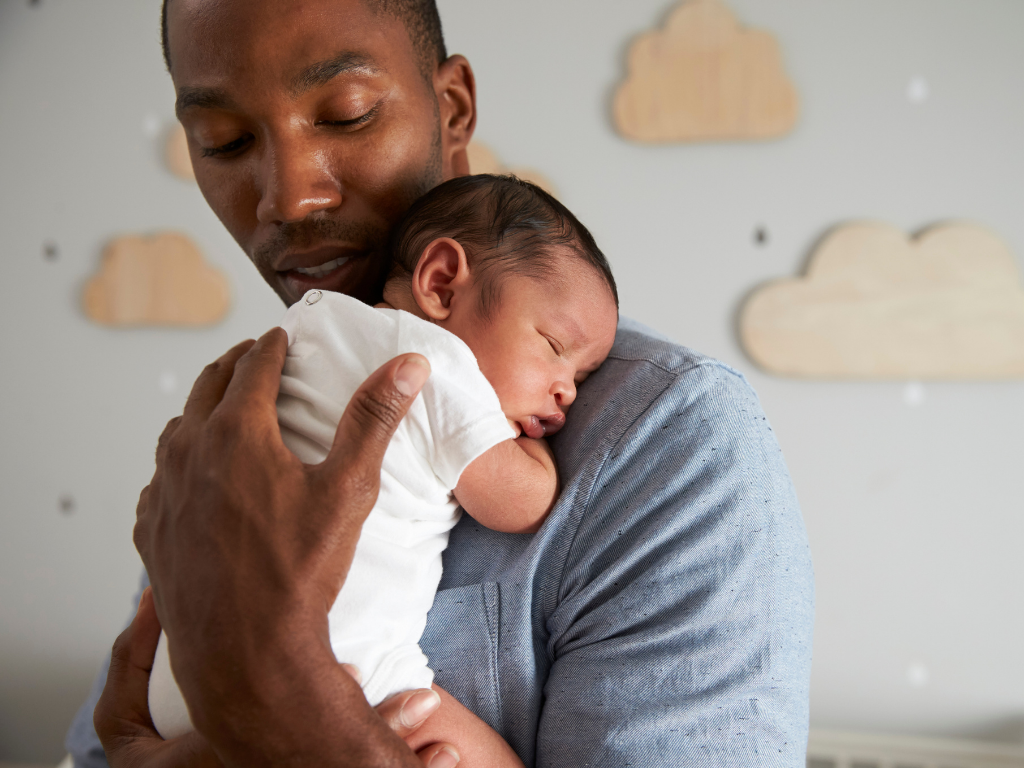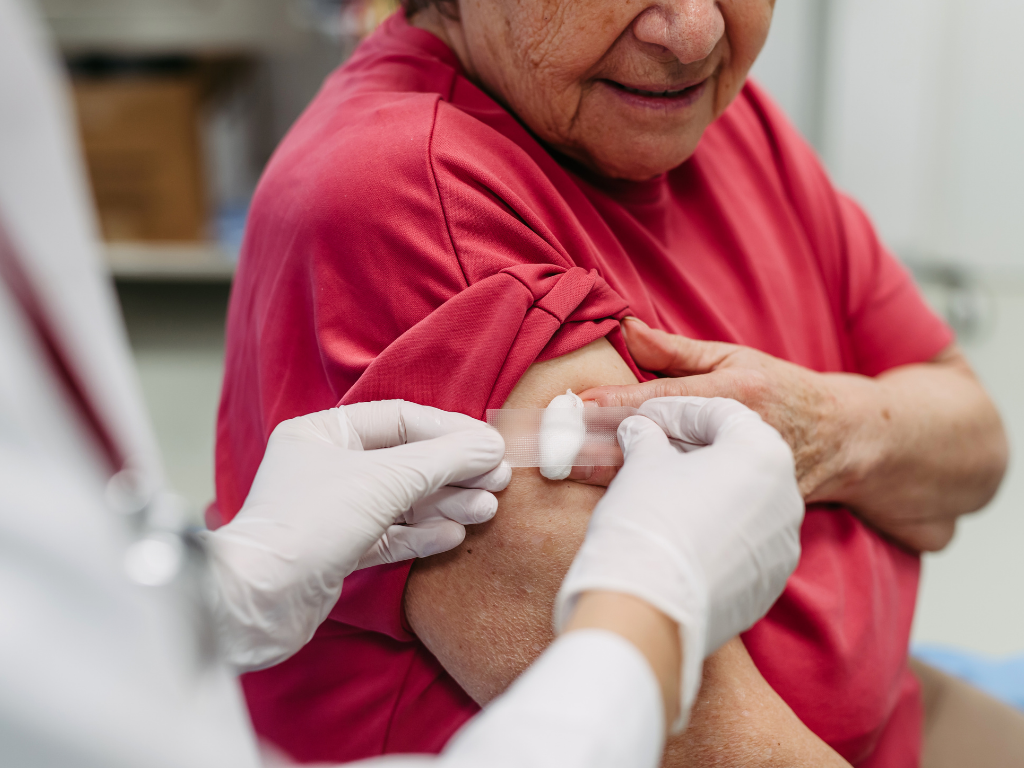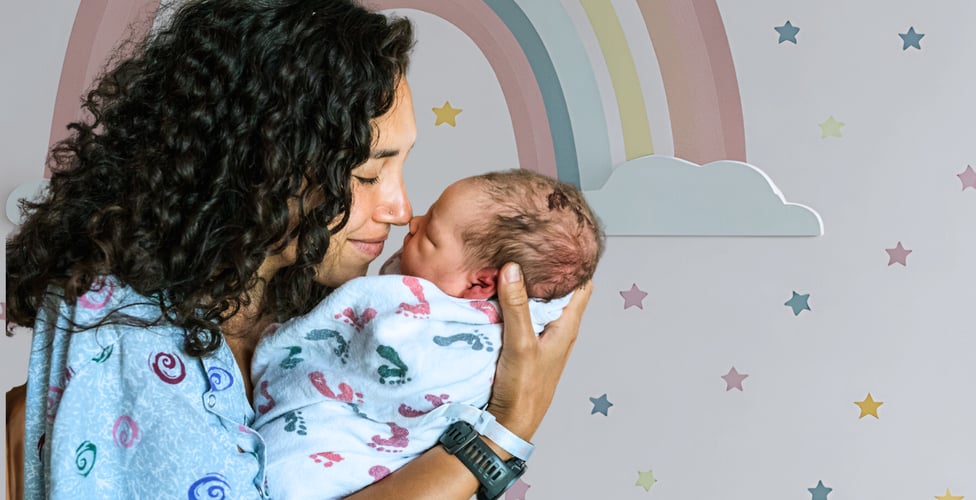Respiratory Syncytial Virus (RSV) is a common virus that circulates every year mostly during the fall and winter seasons. For most people, symptoms may be like a common cold.
For infants, young children, elderly, or immunocompromised people, RSV can become more serious. They may even need to be hospitalized if infected with the virus.
Since the 1960s, health researchers around the world have been studying RSV and potential immunizations against it. Research has made significant progress recently to better protect people against RSV – but ongoing RSV research is still crucial to helping us be better protected, for longer.
Monoclonal Antibodies
What research made possible
A special type of drug called a monoclonal antibody can offer infants protection from RSV. Where a vaccine prompts the immune system to make its own antibodies against the target virus, a monoclonal antibody provides already-made antibodies.
The first monoclonal antibody introduced in 1998, palivizumab, could only offer protection for one month. In the last decade, research has led to new monoclonal antibodies with longer lasting protection.
Now, monoclonal antibodies given to infants at birth can help protect them from RSV for up to five months. A new monoclonal antibody was approved for use against RSV in Canada in 2023. Nova Scotia recently announced that the province will be funding this monoclonal antibody in the 2025-26 season for infants under 8 months old and for some higher-risk infants under 2 years old.

What research is still helping us learn
CCfV is conducting a study that will collect samples and health information to look at infant RSV protection levels before and after receiving the current RSV prevention drug (nirsevimab). The study aims to determine the development of RSV immunity (how the body deals with RSV once the infant has received nirsevimab), record the health of the infants (such as admission to the hospital, wheezing), and measure the development of the immune system.
This type of research helps us grow our understanding of how effective current treatments are and notice if there are ways these treatments might need improvement.
RSV Vaccines
What research made possible
RSV vaccines for adults were approved for use in Canada and the United States in 2023.
These vaccines provide protection to adults at increased risk of serious infections from RSV (such as elderly or immunocompromised people). Nova Scotia is offering RSV vaccines for some seniors in October 2025.

Though vaccines aren’t available for infants, RSV vaccines are available in pharmacies for people who are 32-36 weeks pregnant. This can help protect infants.
“Vaccination in pregnancy leads to an immune response in the parent that is passed to the baby, protecting them in the first months of life when the risk of severe infection is higher,” CCfV investigator Dr. Bahaa Abu-Raya says. This protection can last up to six months after birth.
What research is still helping us learn
Dr. Bahaa Abu-Raya is leading a study of the RSV vaccine in pregnancy along with another important vaccine, Tdap (tetanus, diphtheria and pertussis). Both vaccines are approved for pregnant people so that immunity can be passed on to infants too young to be vaccinated.
The CosTaR study wants to find out if it’s best to give these vaccines at the same visit or at separate visits. This knowledge could help us better optimize protection from these vaccines.

RSV Policies
What research made possible
Nova Scotia recently announced a new RSV immunization program, expanding public funding of monoclonal antibodies for infants and vaccines for seniors. In the announcement, CCfV investigator Dr. Joanne Langley says: “In other provinces and countries, a single dose of nirsevimab prior to the annual RSV outbreak has reduced hospital admissions by up to 85 per cent. In addition to protecting these babies, prevention of RSV lung infection will ease pressure on emergency rooms and hospital beds in the busy winter season.”
Research that examines the impacts of immunizations on health and healthcare system costs can help policy makers decide to invest in monoclonal antibodies or vaccines. This makes the immunizations more accessible to those who otherwise couldn’t afford them.
What research is still helping us learn
In addition to cost, vaccine hesitancy and lack of awareness can also prevent people from accessing immunizations.
A CCfV research study is exploring the views and experiences of expectant parents about immunizing infants against RSV, and ways information about RSV could be shared with parents. Participant input will help develop educational resources to support parents making decisions about RSV immunization.
Educational resources informed by the parents they are intended to support could help improve uptake of protections against RSV for infants.

The future of RSV research
Though protection against RSV has come a long way, the work isn’t done.
Current immunizations against the virus only last for a limited time and leave gaps in protection. There are still no RSV vaccines for infants or children. RSV immunization policies may leave the available protections inaccessible to those who can’t afford them or who weren’t given appropriate information.
Ongoing research can help improve existing vaccines and monoclonal antibodies, inform better policies, and eventually lead to new treatments and vaccines. That research will take global effort – and we’re proud to be a part of it.
Want to help us take the next steps towards improved RSV protection and policies? CCfV is looking for volunteers for these three RSV studies:
-
- Tdap and RSV Vaccines in Pregnancy | A vaccine study looking for participants who are 20-28 weeks pregnant.
-
- Nirsevimab for prevention from RSV in high-risk infants in Nova Scotia | A study to look at infant RSV protection levels before and after receiving the current approved RSV prevention drug.
-
- Parental Acceptability of Emerging RSV Immunization Strategies | An interview study exploring expecting parents’ experiences and perspectives on RSV immunization.
Further Reading:
- Respiratory Syncytial Virus (RSV) | Immunize Canada
- Respiratory Syncytial Virus (RSV) Vaccines: Canadian Immunization Guide | Government of Canada
- Provincial Coverage and Availability | RSV Project
- Historical Perspective on Respiratory Syncytial Virus Prevention: A Journey Spanning Over Half a Century From the Setback of an Inactive Vaccine Candidate to the Success of Passive Immunization Strategy | Journal of the Pediatric Infectious Diseases Society | Oxford Academic
- Intention to Use RSVpreF Vaccine or Nirsevimab to Prevent Infant RSV Among Pregnant Individuals | The Pediatric Infectious Disease Journal
- Hesitancy Toward RSV Immunization Products Common in Pregnant Individuals | Vaccine Advisor



